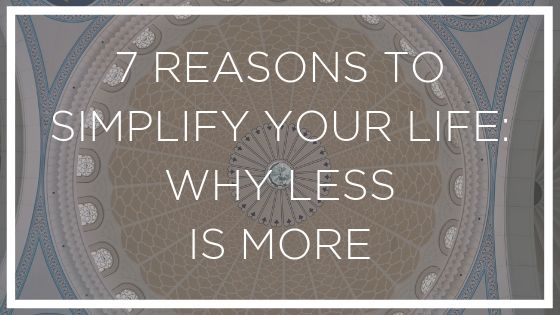My journey with simplicity began long before I first practiced yoga. It was within the books of ancient mystics, stoics and philosophers that I discovered revolutionary teachings. That had me re-evaluating everything about my relationship with the material world. Wasn’t it self-evident that more would be better?
I began experimenting with having less and doing less. While not immediately apparent, over time the benefits of living a life with less were becoming clearer. By prioritising certain things, and focusing on quality over quantity, my life was transforming. Liberated from my old ways of being, I found a new sense of freedom.
Although the recent rise in consumerism and consumption is unparalleled in history, the truth that less can be more has been spread throughout history.
Within the first two limbs of Patanjali’s Yoga Sutras, we find the concepts of Aparigraha (non-attachment) and Santosha (contentment). Two states of mind that are encouraged to better live within our world. What was true two millennia ago, remains true today.
The practice of yoga itself is fundamentally simple, in that it requires nothing but yourself to practice. Yoga mats being a relatively recent modern invention and totally optional.
While everyone’s version of a simpler life will look different, the benefits of doing so are largely universal. Here are 7 of the greatest benefits I have noticed myself and reasons for continuing the practice.
1. Less Stress
Stress is one of the most debilitating factors for our health. Chronic stress, in particular, weakens our muscular strength, immune system, and mental health.
The cause of this is often linked to internal attachments we have created. The expectations we have of certain outcomes, lack of flexibility, and attachment to ideas of who we are, or states of being.
Many of us even identify ourselves with the state of busyness, and when we are deprived of the ability to be busy we feel sensations of guilt, frustration and stress.
By stripping back our beliefs and re-examining what we truly value, we are able to better live in line with our own values. Not those of society or culture. In the process minimising the effect of stress in our life.
2. More Money
Stress also impacts heavily on many people through financial difficulties. In Australia, we have the fourth highest household debt in the world. Many of us are living far beyond our means. Caught in a cycle of constant mindless consumption, never experiencing the peace of mind when not living paycheck to paycheck.
By taking the time to practice contentment with what we have, and how to differentiate between our needs and wants. You will find yourself saving more money.
While more money has been shown to not equal more happiness beyond a certain amount. For those living on lower incomes, the difference of even a few thousand dollars can have a huge impact on happiness and life satisfaction.
3. Less Cleaning / Maintenance
With each new toy, car, gadget or appliance comes an associated cleaning/maintenance cost. The bigger the house, the more time spent cleaning.
Many people I know have recently made the switch from owning a car to using the share economy more. The maintenance costs of owning a car such as insurance, registration, tolls, parking fines, vehicle inspections, oil changes etc. often add up to a greater amount than the yearly cost of using Uber and GoGet.
This is just one example and is highly individual to each person’s work and living circumstances. The concept remains the same though that we have to look at not only the benefit a good provides but the costs associated too.
4. More Time
Another cost associated with anything we introduce to our life is the time cost. The most precious asset of all, that we can never get back.
A great question I like to ask myself regularly is “Do I have enough time for my passions”. If I answer No, I know its time to re-evaluate and cull something from life to make room.
Many of us are working 50-60 hour work weeks, which already leaves little time for socialising or leisure. I know many would take on more work too if the offer was made to them. The question then becomes “Are you working to live, or living to work?”.
By removing some of the non-essential from life, we open up so much more time to pursue the things that we are passionate about. That brings us joy and fulfilment.
5. Saving the Earth
The environmental impact that all our collective consumption is having on the planet is too broad a subject to broach in this short post. You do not need to travel far though to see the waste and garbage buildup on this planet, the plastic filling the oceans.
By burning fewer fuels, buying less plastic, purchasing second-hand goods, we are at the very least slowing the damage we do to the planet and environment. As we are currently living through the sixth great extinction, the Holocene extinction. The culprit of the loss of tens of thousands of species is humanity.
By slowing our consumption we may buy ourselves some time to minimise the damage or even reverse some of the damage we have done to the plants and animals of this world.
6. Increased Productivity
As we have seen, the cost of items is not just the price tag but the time and attention it consumes. This is especially true today as our online life is being transformed into the attention economy. Where the seconds we look at our screens is being sold as advertising space.
The more apps, websites and social media we consume, the more our minds conform to the distractive, hyperlinked model of the internet.
By removing these distractions we are able to enter deeper states of focus and concentration, which for information workers in today’s economy is important. The ability to get more done in less time and increase our productivity, through the reduction of online distractions.
7. Self-Realisation
Taking the time to slow down and witness ourselves when we add more things to our life is a fascinating process. Next time you make a purchase or look to add something new to your life, see if you can pinpoint the hole that is trying to be filled.
It could be a feeling of:
- comfort
- security
- approval
- hopes for the future
- memories/nostalgia
- identity
At the core of all these motivations is the desire to be happy. Perhaps we purchase clothes for the approval of others, which we tell ourselves when we get we will be happy. Or we purchase that drum kit that we had always hoped to play as a kid and believe the story that when we learn this new skill we will be happy.
Ultimately, you are the only one in control of these feelings, and only you have the power to let yourself be happy.
We all create our own pre-requisites to happiness. Be sure not to make yours too demanding.
Summary
Simplicity, minimalism, essentialism. There are many names these days for what is a time-tested practice. It is not a single act, but a mindset that can be applied to every facet of your life. From your digital world to your wardrobe, your hobbies to your social life.
It is a chance to slow down the incessant consumption we have been conditioned to participate in and double down on the things that you really value. Turning down the dials in areas of life that don’t interest you, so that you can turn the dials right up on your own unique interests and passions.

Hi, I am Matt. I am a passionate student of health and wellness. The science of yoga is the most effective system I’ve yet found for bringing about physical vitality with mental clarity. By blending a Western approach of anatomy and alignment, with Eastern philosophies and meditative techniques. My mission is to share these modern and ancient teachings to help others find harmony in their life.
